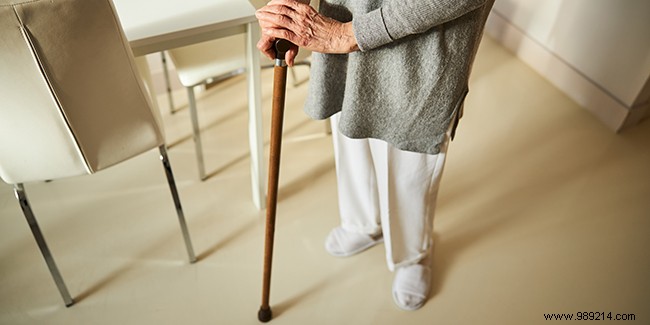
According to Public Health France, the national public health agency, more than 9,000 elderly people die each year following an accidental fall, falls which can also lead to serious injuries and loss of autonomy, a phenomenon that concerns a person over 65 out of three. Aging has consequences on posture and balance that increase the risk of falls. However, simple and common-sense measures that seniors must adopt can prevent or reduce these accidents.
According to a well-known insurance group, 50% of seniors over the age of 65 have already suffered a fall at home. In the elderly, the lack and loss of balance are mainly at the origin of falls which can have serious consequences on their health and in particular their autonomy, even which can lead to their death.
The lack of balance which obviously increases the risk of falling, especially in the elderly, can be due to different causes. For example, vision problems, hearing problems, muscle weakness, certain diseases, dizziness, problems affecting the joints and, even if it is less known, dental problems. Hypertension, diseases that weaken the bones, osteoporosis, etc., also have the effect of increasing the risk of falling, especially among seniors. Similarly, taking certain medications can cause loss of balance and falls.
On the other hand, the elderly who do not take care of their feet, by not regularly having recourse to one or a pedicure, also present a greater risk of falling.
Preventing falls in seniors starts with practicing a minimum of physical activity, and not necessarily difficult sports, at least 30 minutes a day.
To preserve their balance in particular, seniors must continue to move. It is enough simply, when your state of health allows it, not to stop, for example, walking, going up or down stairs, bending down, standing, in short, being active.
Regular physical activity helps maintain flexibility and develop muscle mass, among other things, which are assets for preventing falls.
When you are a senior, favoring a healthy and varied diet helps to stay in shape and avoid the risk of falls.
This first involves eating everything, i.e. proteins (meat, eggs, fish), vegetables and fruits rich in vitamins and minerals, starchy foods that are sources of energy, dairy products which contribute to keep bones strong and fight against osteoporosis which can be the cause of falls which most often cause fractures, etc.
Ensuring adequate nutritional intake keeps the body healthy. On the other hand, excess sugar, salt and fat are to be avoided.
A good diet, which in particular allows you to maintain a good balance and avoid the risk of falls, also requires good hydration. Do not hesitate to consume about 1.5 liters of water a day, which can also be taken in the form of tea, herbal teas, soups, etc., avoiding drinks that are too sweet and of course alcohol.
For seniors who live at home in particular, protecting themselves against the risk of falls involves, in particular, adapting their housing and their environment. The home is indeed the place where the elderly are the most victims of falls. The risks are very high, especially on stairs or parts of water such as the bathroom or the kitchen where the floors can be slippery.
In this area, gestures or actions that are usually simple to put in place can prevent the risk of falls.
To avoid falls at home, it is therefore advisable to ensure that all the passages in the house are free as much as possible by removing the electrical wires lying around on the ground or any bulky objects, carpets, etc., which may hinder the circulation. It is also very important that the rooms in the house have good lighting.
In order to secure the home of an elderly person and thus reduce the risk of falls, it is also recommended to install in strategic places (bedroom, toilet, bathroom, etc.) bars or handrails intended to help her when she sits down or stands up.
All flooring in the house should also be non-slip, especially in wet rooms, bathrooms and kitchens.
In order to avoid falls and their consequences, which can be serious, in general, seniors must take particular care of their health.
It is therefore important to have your eyesight checked regularly by an ophthalmologist. To periodically visit your doctor who can, for example, detect balance disorders.
For older women in particular, it is also important to watch for signs that may suggest the onset of osteoporosis, a disease that causes falls and most often fractures with significant consequences in terms of loss of weight. autonomy.
Even if we are not always aware of it, making sure to maintain good sleep also plays a big part in staying healthy and therefore helps to reduce the risk of falls.